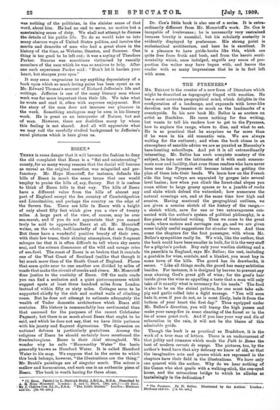THE PYRENEES.* Ma. BELLOC is the creator of a new
form of literature which might be described as topography tinged with emotion. He has a most accurate geographical mind, which delights in the configuration of a landscape, and expounds with lover-like devotion not the beauties so much as the landmarks of a countryside. In his new book Mr. Belloc is as austere an artist as Baedeker. He cares nothing for fine writing, but wants to tell his readers how to get to the Pyrenees, how to explore the range, where to dine, and what to eat. He is so practical that he surprises us far more than if be were in his old romantic vein. We are always waiting for the outburst; and when the book closes in an atmosphere of sensible advice we are as puzzled as Macaulay's bare-hunting schoolboys. And yet it is all extraordinarily interesting. Mr. Belloc has such complete mastery of the subject, he lays out the intricacies of it with such consum- mate ease and lucidity, that even those readers who have never been near the Pyrenees will become intent on getting the plan of them into their heads. We learn how on the French side the long valleys are separated by gorges into several level basins ; how when you climb the forest-clad slopes you come either to large grassy spaces or to a jumble of rocks and slabs which defend the watershed; how numerous the natural crossings are, and at the same time how high and evasive. Having mastered the geographical outlines, we are given a concise sketch of the history of the range,— a sketch which, save for one or two extravagances con- nected with the author's system of political philosophy, is a fine piece of historical writing. Then we come to the great roads, where motors and carriages can go, and we are given some highly useful suggestions for circular tours. And then come the chapters for the foot passenger, with whom Mr. Belloc's sympathies really lie. We wish, like the author, that the book could have been smaller in bulk, for it is the very stuff for a pilgrim's pocket. Buy only your woollen clothing and a tin pannikin in England, says Mr. Belloc ; the rest, including a goatskin for wine, sandals, and a blanket, you must buy in some town of the hills. The gourd has its drawbacks, it seems. "Like all things made, the gourd has many subtleties besides. For instance, it is designed by heaven to prevent any man abusing God's great gift of wine; for the goat's hair inside gives the wine so appalling a taste that a man will only take of it exactly what is necessary for his needs." The food is also to be on the stoical pattern, for one must take salt- pig and garlic rolled into a tight sausage. "You will soon hate it, even if you do not, as is most likely, hate it from the bottom of your heart the first day." Thus equipped under Mr. Belloc's direction, you will tramp the high passes and make your camp-fire in some clearing of the forest or in the lee of some great rock. And if you lose your way and die of exhaustion in the rain, it will not be the blame of this admirable guide.
Though the book is as practical as Bradshaw, it is the work of a true man of letters. There is an undercurrent of that jollity and romance which made the Path to Rome the best of modern carnets de voyage. The pictures, too, by the author's hand have that airy delicacy we know- of old, so that the imaginative arts and graces which are repressed in the chapters have their field in the illustrations. We have only one quarrel with the author. Why do we hear othing of the canon who shot quails with a walking-stick, the one-eyed horse, and the miraculous bridge to which he alludes so tantalisingly in the dedication F • The Pyrenees. By H. Belloc. Illustrated by the Author. London : Methuen and Co. [78. 61. net.]














































 Previous page
Previous page